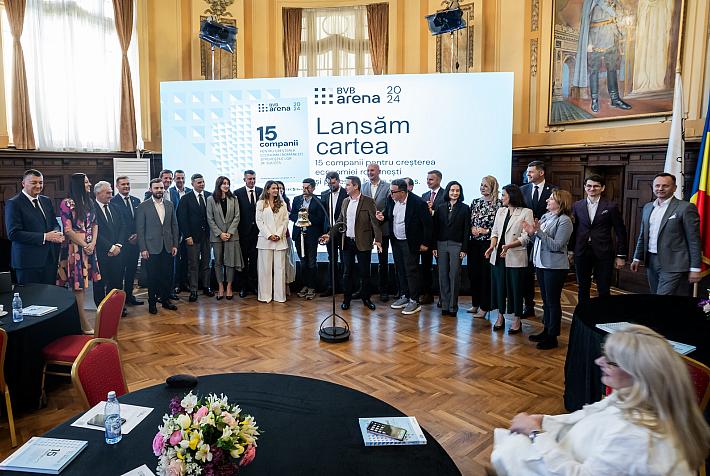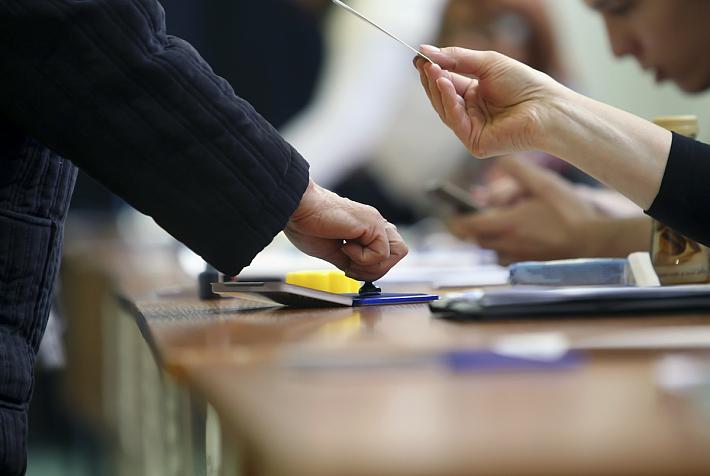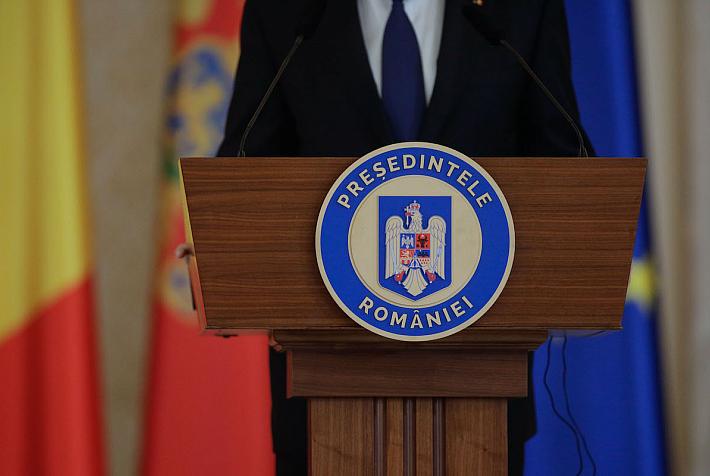Romania-Insider Monthly Wrap-up for September: Double crisis

Our monthly overview for Romania Insider members brings you the main topics of the month, to make sure you don't miss the bigger picture, no matter how often you choose to read the news. If you choose to stay away from much of the media frenzy, this monthly bulletin brings the essentials without wasting a lot of time, in a basic visual version, so you can focus on the text alone.
Opening photo: Prime minister Florin Citu salutes the members of the National Liberal Party (PNL) who elected him as their leader at the party congress on September 25 - Photo source: Inquam Photos / Octav Ganea
A double crisis hit Romania in September: a political crisis and a health crisis. As a result, the country now has a weak Government hanging by a thread, which has to deal with the fourth wave of the COVID-19 pandemic – one that seems more serious than the ones that have passed. Luckily, the economy is still doing good for the moment and the business sector has ignored the political turmoil so far. Still, without a stable Government and a parliamentary majority to support reforms, Romania risks wasting yet another chance to catch up with its EU peers – the EUR 29 bln National Recovery and Resilience Plan.
September started with a quarrel in the ruling coalition, related to a EUR 10 bln local development plan promoted by Liberal prime minister Florin Citu and opposed by the reformist USR-PLUS party due to lack of accountability. The quarrel turned into a political crisis when Citu singlehandedly decided to dismiss justice minister Stelian Ion (USR-PLUS) for not endorsing the program. USR-PLUS reacted by pulling out its ministers from the Citu Government and initiating a no-confidence motion against the PM. The reformists say they want to continue as part of the center-right coalition with the liberals and the ethnic Hungarians’ party (UDMR), but only if Citu leaves.
Once started, the political crisis unfolded rather slowly as Citu managed to buy time, with some unofficial support from the Social Democrats (PSD), the biggest opposition party. PSD delayed the vote on a no-confidence motion against the Government until after the Liberals elected their new president – PM Florin Citu himself. President Klaus Iohannis once again abandoned his political neutrality as head of state and directly supported Citu in his internal party battle with Chamber of Deputies speaker Ludovic Orban.
While Citu managed to secure the PNL leadership, his Government has very weak support in Parliament, where PNL holds only about 20% of the seats, and some Liberal MPs are unhappy with the outcome of the internal elections. In these conditions, only a miracle can prevent the Government’s dismissal through no-confidence motion. Such “miracle” would be lots of Social Democrat MPs suddenly falling ill on the day of the vote, which would signal unofficial PSD support for the Citu cabinet. The Social Democrats have no real interest in taking over right now, when they would have a difficult situation to manage and would prefer Citu to continue leading a weak Government which would further weaken his party’s score. However, even if the Government falls, Citu may still continue as PM for several months, as the process of forming a new Government will not be easy. Early elections, a scenario that would play in PSD’s favor, are not likely given the epidemiological situation.
On the bright side, the European Commission greenlighted Romania’s National Recovery and Resilience Plan (PNRR) in September. Under this scheme, Romania will get EUR 29 bln worth of EU money, half through grants and half through EU-backed loans. The plan will finance investments in digitization, green energy, and infrastructure. However, Romania has also committed to pursuing significant reforms, which are impossible without a stable Government and parliamentary majority. Thus, many are concerned that Romania could waste another chance to develop because of its weak politicians.
However, the Government’s biggest problem right now is the fourth wave of the COVID-19 pandemic. The number of new infection cases in Romania exploded from under 1,500 per day at the beginning of September to 12,000 on the last day of the month, which is also a record since the start of the pandemic. And the situation is only going to get worse in October, when health experts expect over 20,000 new cases per day. The number of serious cases and deaths has also followed the same trend.
However, despite the health situation, which is worse than it has ever been in Romania since the COVID-19 pandemic started, the Government wants to avoid imposing tough restrictions and tries to keep the economy open. The authorities have also changed their mind about closing schools when the incidence rate passes 6 new cases per 1,000 inhabitants and has relaxed the regulations in this sense. Restaurants, hotels, cinemas and other indoor venues remain open and both private and public events will continue but will be open only to vaccinated people or to those who have had the disease.
Romania has the second-lowest vaccination rate in the EU, with little over a third of the population immunized. The vaccination numbers increased a bit at the end of September, but only because Romania started administering the third dose to those already vaccinated.
Besides the health crisis, Romania also faces an energy crisis as energy prices have increased to record levels and more increases are likely as the country’s gas and power production doesn’t cover domestic consumption. The Government wants to subsidize vulnerable energy consumers this winter.
So far, the economy has been in recovery mode and has maintained the positive momentum. However, it remains to be seen how much this will last, as there are multiple warning lights blinking right now. One of them is the rising inflation, which will likely trigger an interest rate hike before the end of this year.
In business, the fall of Romania’s biggest insurer – City Insurance – was the main event in September. City’s business was close to EUR 500 mln in 2020. However, the Financial Supervisory Authority (ASF) found that the company apparently lied about a reserve account it had at a bank in Switzerland, which was used at calculating its legal reserves. This means that the company overstated its solvency ratios. This case also has political ramifications as the company’s majority shareholder is the brother-in-law of former Romanian PM Adrian Nastase. There are suspicions that the financial regulator’s politically appointed members may have closed their eyes to the irregularities in City’s reports.
The energy sector remains hot, with the Black Sea gas and renewables taking the spotlight. Company financing through the stock exchange and equity crowdfunding is also gaining traction and the real estate sector continues to draw significant investments.
In other news, September’s highlight was Emma Raducanu’s victory at the US Open. Raducanu has British citizenship, but her father is Romanian and her mother is Chinese, which is why her result was also widely celebrated in Romania.
Below, you can browse through the most important topics in September, grouped by relevance. By clicking on a title, you can read the whole article on the Romania-Insider.com website.
COVID-19 - Fourth wave has hit
- Romania, far behind as EU reaches 70% of adult population vaccinated
- Fake vaccination certificates: 200 criminal cases and 400 people investigated in Romania
- Most COVID-19 deaths in Romania are among unvaccinated, health official says
- PM: Romania shouldn't close down economy after 3 per thousand Covid incidence
- Romania to introduce green pass regulations to keep economy open
- Covid outlook in Romania deteriorates sharply: 20,000 daily cases in October
- Covid-19: Vaccination lottery to open in Romania next month
- Update: Few intensive care beds empty as Covid-19 daily case count keeps rising in RO
- COVID-19: Bucharest passes 50% vaccination rate
- Bucharest enters red scenario as COVID incidence rate goes over 3 per thousand
- COVID-19: MedLife estimates 35,000 daily cases in Romania, five times more than officially reported
- Romania starts administering third dose of COVID-19 vaccine
- Romania sees record daily rise in new COVID-19 cases
- Romania’s daily Covid-19 case count reaches new record high
- Bucharest to introduce additional restrictions as COVID incidence rate goes over 6 per thousand
- RO Ombudsman defends health workers who refuse vaccination and testing
- New regulations in RO for Covid-19 incidence rate higher than 6 per thousand
- Romania extends state of alert by 30 days
- School starts in Romania for almost 3 mln students, but not all return to in-person classes
- Education minister says Bucharest schools could go online in about a month
- Romania to keep schools open, except for classes where Covid cases are spotted
- Romanian prosecutors open investigation on Covid vaccine acquisitions
POLITICS: Chaos
Domestic politics
- Romania’s ruling coalition on the brink of break due to dispute on EUR 10 bln development program
- Romania’s PM dismisses justice minister and loses support from coalition partner USR-PLUS
- Reformist USR-PLUS pulls out of Romania's Government
- Romanian prime minister names new interim ministers
- Romania's Govt. endorses controversial EUR 10 bln public investment project
- No breakthrough in Romania's political deadlock
- RO Social Democrats boycott no-confidence motion, buy time for Liberal PM Citu
- Unstable majority forms against Romanian Liberal PM Citu
- Romania's President not concerned "at all" about political turmoil
- Romanian Liberals seek to overthrow reformist head of Senate
- Romanian PM remains in office "to avoid state's collapse"
- Romania's Constitutional Court defers key decision on no-confidence motion against Govt.
- Romanian PM says political turmoil has no impact on fiscal policy
- RO president Iohannis sees PM Citu in his seat until 2024
- RO PM Citu wins party leadership but is far from restoring majority support in Parliament
- Romanian reformist USR-PLUS rejects any deal with PM Citu
- PLUS candidate Dacian Ciolos leads in race for USR-PLUS leadership
- Romanian PM Citu seeks political support from 'any party' - meaning Social Democrats
- Romania's Social Democrats bury reformists' no-confidence motion against Govt. to file "better one"
- RO Social Democrats present no-confidence motion against Govt. in Parliament
- Poll: Romania’s Social Democratic Party strengthens leading position
- Poll: RO President and opposition leader share same negative favorability scores
- Romanian minister of agriculture resigns to prevent dismissal
Political decisions with impact on business
- European Commission greenlights Romania’s EUR 29.2 bln recovery and resilience plan
- EU officials: Romania needs a functioning Government to implement PNRR
- Romania's PNRR: 4.3GW of new green & gas power units to replace coal-fired plants by 2025
- Romania’s minority Government endorses budget revision
- Romanian President puts energy prices on the European Council agenda
- Romania's Govt. looks for solutions to tackle rising energy prices
- Romania's Parliament enacts subsidisation of low-income households’ energy bill
- Romanian lawmakers set up committee to investigate excessive energy prices
- Spot electricity price in Romania triples YoY in August
- Romanian Social Democrats argue for energy price capping as short-term fix
- RO minister rules out potential energy shortages during coming winter
- Gazprom hints at rising natural gas prices this winter
- Romanian energy market regulator ANRE expects more price hikes this winter
- RO minister promises law for offshore wind farms this year
- Romania's labour minister thinks of “significantly higher” minimum statutory wage
- Romania's Govt. rushes up to hike minimum wage in line with prices
- RO FinMin ponders phasing out income tax, social contribution waivers
MACROECONOMY : Uncertainty builds up
Official data
- Romania's industry reports 14% bigger output and 24% larger revenues in Jan-Jul
- Romania’s retail sales virtually flat in July
- Romania’s inflation accelerates to 5.3% in August
- Average wage in Romania up 0.2% YoY in July
- Romania’s unemployment rate goes up in July
- Romanian trade unions push for 10% hike of minimum statutory wage
- Romania reports trade deficit of nearly EUR 13 bln in January-July
- Romania’s CA deficit widens to 6.7% of GDP at end-Jul
- Romania’s foreign exchange reserves climb to new high in August
- Romanians buy 7.5% more new cars in Jan-Aug
Forecasts
- Fitch: Political turmoil puts at risk fiscal consolidation in Romania
- S&P doesn’t see imminent fiscal risk in Romania
- Raiffeisen Romania expects higher inflation, twin deficits to prompt policy rate hikes
- BNR adviser: 5.6% year-end target inflation may need upward revision
- Food prices to rise by 10%-12% in Romania over next several months - forecast
- Bloomberg poll shows EUR still below RON 5 at the end of 2021
- Banca Transilvania trusts Romania can catch up with EU average GDP by 2030
- McKinsey: Romania’s economy can gain up to 8.7% p.a. from gender equality
- Romanian CFA analysts tone down optimism that remains still robust
- Romanian investors file their own 'no-confidence motion' against Govt.
- AmCham Romania: Investors’ confidence level drops amid political turmoil
- FIC survey: Foreign investors' sentiment remains robust in Romania
- German companies in RO report major supply chain disruptions and rising prices
BUSINESS: Biggest insurer crashes, Orange takes over Telekom
Insurance industry under shock
- Foreign investor fails to rescue biggest Romanian insurer City
- RO insurance: City's collapse will make a bigger splash than Astra or Carpatica did
- Biggest Romanian insurer City loses license and heads toward bankruptcy
- City Insurance’s main owner reportedly siphoned out EUR 18 mln since 2017
- RO Govt. calls for investigations in case of EUR 0.5 bln City Insurance bankruptcy
- Market regulator says there is enough money for creditors of bankrupt insurer City
- Romania's Govt. ponders regulating car repair fees to fix insurance market problems
- EBRD brings EUR 30 mln to Eurohold “predominantly for RO subsidiary”
- Uniqa insurer steps back from Romania’s liability car insurance market
Gas and renawables under focus
- Romanian president: Romgaz entering Neptun Deep project creates "encouraging premises"
- Romania's Romgaz seeks EUR 350 mln to pay for Exxon's 50% stake in Neptun Deep
- American-backed project could start gas deliveries from Black Sea by the end of this year
- BSOG completes Black Sea offshore platform in Romania
- Romania's Hidroelectrica reaches historic valuation after strong first-half results
- Romania's Hidroelectrica seeks consultants for two PV projects
- Enel to develop in Romania two PV parks with a total capacity of 90 MWp
- Seven prospective bidders for troubled Romanian 1.3GW coal power plant
- Danish renewable energy group enters Romanian market
- Renovatio returns to Romania’s green energy market with 50 MW wind project
- Swiss Clariant to complete EUR 140 mln bioethanol plant in Romania this year
Investments, M&A and financing
- IFC committed USD 419 mln to Romania's economy in FY 2021
- Roland Berger to advise Romania's Salrom on graphite exploitation
- DeepRock Minerals of Canada buys another gold concession in Romania
- Romanian steel mill Liberty targets 50% increase in output to 3 mln tonnes
- Prada invests EUR 19 mln in its second plant in Romania
- Orange takes over 54% in Telekom Romania Communications for EUR 296 mln
- OTE completes purchase of 30% in former Cosmote
- French group Lectra takes over Romanian software producer Gemini CAD Systems
- Romanian PE fund Black Sea Fund takes over local board game producer D-Toys
- Mezzanine Management's ACM IV to take over eight farms in Romania
- Carrefour Romania takes over delivery platform Bringo
- Romanian Allview brand owner invests in AKAI regional distributor
- Romanian deep tech startup raises USD 9 mln through private sale of cryptocurrency
- Romanian online retailer Elefant reportedly prepares IPO
- Romanian software company raises EUR 1.2 mln to open offices in the US and Israel
- Fresh Microgreens raises EUR 0.5 mln in private placement before AeRO listing next year
- RO Prop-Tech startup aims to raise EUR 500,000 financing
- RO voice recognition start-up Vatis Tech raises EUR 0.2 mln
- Iranian investor wants to buy 7% of Romanian investment company SIF Muntenia
- Raiffeisen Romania fined as it delays returning EUR 10 mln to customers
- Biggest Polish bank PKO to enter Romania with corporate division
Real estate
- Colliers: Lower real estate deals in Romania, but perspectives remain good
- Romanian real estate developer Impact drafts EUR 1.4 bln investment strategy by 2027
- South African fund Fortress enters Romania's logistics spaces market
- CTP adds 112,000 sqm to its logistics portfolio in RO for EUR 50 mln
- Major Israeli group kicks off EUR 100 mln residential project in eastern Bucharest
- Romania's residential market reflects wide income discrepancies
Other business news
- Dacia unveils new 7-seater family car Jogger, orders to open in November
- Ford to discontinue EcoSport model produced in Romania
- Romania’s car production up 16% YoY in Jan-Aug on low base effects
- Romanian carmaker Dacia suspends production again for lack of semiconductors
- Deutsche Bank’s tech center in Bucharest launches cyber security division
- French fintech iBanFirst opens first CEE office in Bucharest
- Blue Air to reopen Iasi base in eastern Romania in 2022
- Romanian cryptocurrency Elrond breaks USD 5 bln market cap after move into US
- Google Pay app available in Romania
- HBO Max to launch in Romania next year
SOCIAL & LIFE: Imbalances grow, return of the festivals
Social issues
- Romanian Senate adopts draft law introducing visas for digital nomads
- Active Romanian population keeps leaving the country
- Romanians show less optimism compared to EU average
- Romanians think the country’s general situation keeps getting worse, survey shows
- Survey: Three out of four RO employees experienced burnout in the past five years
- Journalists, environmental activist beaten in Romania during investigation on illegal logging
- Eastern Romania: New EUR 100 mln hospital to be built in Galati
- Bucharest ranked among best cities in the world for a workation
- Romania’s Buzău Land gets closer to obtaining the UNESCO Global Geopark title
- 2021 European Heritage Awards: Small wooden church in Romania wins Grand Prix & Public Choice Award
- Working abroad report: Romanian expats are younger than the average, work in IT and are happy with their salaries
- Romanian canoeing champion Ivan Patzaichin passes away at 71
- Romanian actor Ion Caramitru passes away
Sports & entertainment
- British player with Romanian roots wins US Open and writes tennis history
- Romania’s tennis star Simona Halep marries boyfriend Toni Iuruc
- RO tennis star Simona Halep and Darren Cahill end coaching partnership
- Cyclist Jakub Kaczmarek wins Tour of Romania race
- Czech tennis player Jiri Lehecka wins Romania’s Tiriac-Nastase Trophy
- Romanian firefighter wins the Ultra Bolivia Race 2021
- John Malkovich to play Romanian conductor Sergiu Celibidache in upcoming film
- Catherine Zeta-Jones to film in Romania for Netflix's Wednesday series
- San Sebastian 2021: Romanian film wins top prize
- Venice Film Festival: RO film gets debut award
- Astra Film Festival announces winners of 2021 edition
- Untold 2021: More than 265,000 people attend music festival in Romania
RI+
A new way to experience Bucharest with German theater group’s audio walks app
Film review and interview – Wild Romania, a ten-year journey from idea to breathtaking nature documentary
Working abroad: New report reveals the Romanian expat's profile
Circular economy initiatives in Romania
Romania travel: Destinations to discover traditional foods












